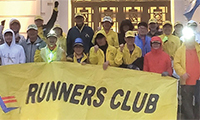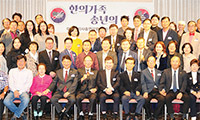DUBAI, United Arab Emirates - Bathed in the glow of the skyline’s glitter, the centerpiece of Dubai’s financial hub seems equal to the thrusting ambitions of the foreign investment bankers rushing to set up shop here.
“This is the new Wall Street - it’s the center of gravity, said Fares Noujaim, Merrill Lynch’s new president of the company’s business in the Middle East and North Africa, pointing up at the main building of the Dubai International Financial Center that covers the sky above him.
Called the Gate, it seems more a giant slab of modern art than an office building.
The Dubai boom has been riding oil’s ascent for years now. Its ultramodern skyline, which barely existed little more than a decade ago, has become a prominent symbol of the emergence of this once scrubby emirate on the western coast of the Persian Gulf as the Middle East’s principal financial, trade and tourism center.
But as the deepening bite of the credit crisis spreads from Wall Street and takes a global toll - torpedoing once-buoyant markets from Shanghai to Stockholm - the Gate has recently become an even more powerful beacon for a swarm of deal makers looking to stake their claim in one of the world’s last remaining bull markets.
The numbers are staggering. Dubai’s economic growth is running at roughly 11 percent a year and the government expects it to continue at that pace. Housing prices spiked 42 percent in the first three months of the year.
Even though it has little oil of its own, Dubai’s welcoming social and investment climate, along with special zones with independent laws, has turned it into a massive trading center , beyond Beirut in the 1970s and Hong Kong in the 1980s.
Economists warn of an unmanaged boom, as high inflation, a weakening currency and rampant construction stoke fears of a severe reversal to come.
But for Mr. Noujaim, such concerns are for another day. “Bubble? What bubble?’ Mr. Noujaim asked, pressing his case that the global demand for oil, despite the recent dip in prices, would push its value even higher. “This will be the next Singapore or Hong Kong.
Earlier this decade, multiple trips to China became the de rigueur assignment among Wall Street chief executives panning for rich overseas deals.
Now it is the Middle East: John J. Mack of Morgan Stanley and Lloyd C. Blankfein of Goldman Sachs have been here several times since the latest boom erupted a few years ago. Richard S. Fuld Jr. of Lehman Brothers has come once and John A. Thain, who took over at Merrill last year, is scheduled to arrive this fall.
Morgan Stanley highlights its 42 Dubaibased investment bankers and a flourishing office in Riyadh, Saudi Arabia; Citigroup has recently moved its co-head of investment banking, Alberto Verme, to the region; Deutsche Bank and UBS are sending bankers over in bundles; and Goldman Sachs has sent a top fixed-income ally of Mr. Blankfein’s to plant the firm’s flag.
And Barclay’s wealth management unit, Global Investors, recently established an office in the financial center here.
For the corporate executives in the region, the question is this: Will Merrill, Morgan and Goldman be here when the inevitable correction comes?
To listen to Georges Makhoul, the chief executive of Morgan Stanley’s Middle East business, the answer is a resounding yes. Morgan Stanley arrived here in 2005 and became one of the first American banks to establish a presence. “We have over 150 people in the region, he said. That is an example of making the right bets.
It is not just a march of bankers - Dubai lures as many as 20,000 new people a month, a number that includes large numbers of workers from the South Asian subcontinent who make the bankers’ beds in hotels and drive them around in the cool comfort of their Mercedes (about 90 percent of Dubai’s population of 1.4 million is foreign).
“We, too, come here for the money, said Mosrallah Khan, who works a 12-hour day as a taxi driver to earn enough to send home to his family in Peshawar, Pakistan.
When night falls, the deal making continues even as the action shifts from the board room to the many bars and nightclubs located in the city’s hotels.
“Look at all this growth, said Mr. Noujaim, as he sat immobile in a traffic jam in Riyadh in June, surrounded by skyscrapers, some recently completed, others still under construction. “This could be America 100 years ago.
스마터리빙
more [ 건강]
[ 건강]이제 혈관 건강도 챙기자!
[현대해운]우리 눈에 보이지 않기 때문에 혈관 건강을 챙기는 것은 결코 쉽지 않은데요. 여러분은 혈관 건강을 유지하기 위해 어떤 노력을 하시나요?
 [ 건강]
[ 건강]내 몸이 건강해지는 과일궁합
 [ 라이프]
[ 라이프]벌레야 물럿거라! 천연 해충제 만들기
 [ 건강]
[ 건강]혈압 낮추는데 좋은 식품
[현대해운]혈관 건강은 주로 노화가 진행되면서 지켜야 할 문제라고 인식되어 왔습니다. 최근 생활 패턴과 식생활의 변화로 혈관의 노화 진행이 빨라지고
사람·사람들
more
LA 러너스클럽 새해맞이 등반 행사
LA 러너스클럽(회장 대니얼 임)은 지난 1일 새해맞이 그리피스팍 등반 행사를 가졌다. 이날 회원 30여 명은 쏟아지는 비 속에서도 그리피스팍…

미주한의사총연 송년행사
미주한의사총연합회(회장 조본환·이사장 서영수) 송년회가 지난달 14일 LA 옥스포드 팔레스 호텔에서 열렸다. 이날 행사에서는 프란시스코 김 캘…
[인터뷰-문경환 한인회장] “캔자스, 이민자들에 … 1
“캔자스시티는 삶의 속도와 기회의 균형이 잘 맞는 도시입니다. 제2의 인생을 시작하기에 더없이 좋은 곳이죠.”29일 본보를 방문한 문경환(61…
일사회 창립 14주년 기념식 및 송년행사
전·현직 민주평통자문위원들의 모임인 일사회(회장 박철웅)는 지난 16일 용수산에서 창립 14주년 기념식 및 송년회를 개최했다. 이날 행사에는 …
LA평통 통일전략분과 상견례
LA 평통(회장 장병우) 통일전략분과(위원장 이정현)는 지난 27일 형제갈비에서 상견례 겸 간담회를 개최했다. 이날 모임에서는 위원 간 교류를…
많이 본 기사
- 베네수 대통령궁 인근서 굉음… “미확인 드론에 대응사격 가능성”
- 트럼프 “베네수 석유산업, 美기업들이 1년 반 안에 재가동할것”
- [美 마두로 축출] CIA, ‘마두로 측근으로 과도정부 구성해야 안정적’ 평가
- 공영방송 지원기구 CPB 결국 해산…트럼프 ‘예산 중단’에 백기
- [건강포커스] 美 보건부 “자가 채취 HPV 검사, 자궁경부암 공식 검진에 포함”
- [美 마두로 축출] ‘권력 구심점’ 잃은 베네수, 체제안정에 주력
- [美 마두로 축출] “미국여론도 갈라… 1
- [美 마두로 축출] 게릴라 출신 콜롬비아 대통령 “위협하면 무장”
- 백악관 “까불면 다쳐”…트럼프 사진배… 1
- 한미, 美 암모니아 플랜트 착공 기념행사서 “협력 확대” 다짐
- [CES 2026] 엔비디아, 슈퍼칩 베라루빈 조기공개…자율주행 플랫폼도 선봬
- “김혜성 트레이드는 안돼” 다저스가 반드시 지켜야 할 선수, 美 매체가 ‘트레이드 불가론’ 외친 이유
- 혈압·혈당·콜레스테롤 개선하려면 체중 3.5㎏ 줄여라
- 아동 예방접종 권장 질병 17→11종으로 축소…의료계 반발
- “토할 뻔했다”…인천 송도서 ‘닭똥 삼계탕’ 논란
- [美 마두로 축출] 베네수 부통령, 임시대통령 취임… “고통스럽다”
- 韓 국토장관 “K-건설 美서 수주 확대 단계…비자문제 해결 노력”
- [이민법 칼럼] 시민권 박탈
- 트럼프 “관세 6천억 달러 징수 또는 징수예정”…결정앞둔 大法 압박
- 외국인 2.2조 쓸어담아… 진격의 코스피 “1분기 내 5000 간다”
- 박나래, 갑질·19금 폭로 이어 20억 탈세 의혹까지 ‘첩첩산중’
- 호주식 스페셜티 커피와 베이커리 만나보세요
- 마두로, 美법원서 무죄 주장 “난 여전히 대통령…납치당했다”
- ‘어쩔수가없다’, 美 45개 극장서 조용한 흥행…박스오피스 12위
- 뉴욕시 새해 첫 살인사건 브롱스 택시운전자 총격사망
- 밴스 부통령 자택에 침입시도…비밀경호국, 범인 구금
- 뉴욕증시, 베네수엘라가 열렸다…강세 마감
- LAX 또 항공편 대거 취소·지연 사태
- [한인 은행·업체 시무식 화보] “붉은 말 기운받고 한인 경제 도약에 기여하자”
- ‘대박’ 김민재(30·레알 마드리드), 뮌헨이 먼저 제안했다… “당장 겨울 임대 후 여름에 424억 완전 이적”
- 입국 제한 확대… 추가 20개국 이민 신청 전면 중단
- 캘리포니아 ‘직장 내 권리 알림법’ 시행 돌입
- “김건희 여사와 친분” 이영애, 유튜버 손해배상 소송 결국 ‘취하’
- 메디케이드 정보 이민국 공유 ‘허용’
- 美 “조세회피막는 OECD최저세, 美기업엔 면제…약 150개국 동의”
- 정부, 故 안성기 두 아들에 ‘금관문화훈장’ 건넸다.. “영원히 기억할 것”
- 미 전역서 변종 수퍼독감 ‘비상’
- 맘다니(뉴욕시장) ‘아파트 렌트 동결’ 공약 실현되나
- [美 마두로 축출] 갈라진 세계…안보리서 미영프 vs 중러 첨예대치
- 현대차·기아·제네시스… 2025년 판매 역대 최다
- 셀트리온, 미 뉴저지 생산시설 인수… CDMO 영토 넓힌다
- “트럼프 폭주… 달러 패권 흔들”
- 해외 송금시 1% 세금 1월1일부터 부과 개시
- 아마존 ‘AI 비서’ 웹서비스 알렉사닷컴 출시…챗GPT에 도전장
- [신년 집중기획/2026 새해 이렇게 바뀐다] 이민 제도 5대 변화… 영주권자까지도 입국시 안면인식 생체정보 수집
- 美, 베네수 석유사업 장악 속도?…에너지장관-기업들, 금주 회동
- “독일 정보당국, 오바마 전용기 통화 몇년간 도청”
- 가주 DMV 리얼 ID 발급 ‘전산 오류’
- 미주한의사총연 송년행사
- [美 마두로 축출] 다음 타깃?…트럼프 입 주시하는 국제사회
1/5지식톡

-
 미 육군 사관학교 West Poin…
0
미 육군 사관학교 West Poin…
0https://youtu.be/SxD8cEhNV6Q연락처:wpkapca@gmail.comJohn Choi: 714-716-6414West Point 합격증을 받으셨나요?미 육군사관학교 West Point 학부모 모…
-
 ☝️해외에서도 가능한 한국어 선생님…
0
☝️해외에서도 가능한 한국어 선생님…
0이 영상 하나면 충분합니다!♥️상담신청문의♥️☝️ 문의 폭주로 '선착순 상담'만 진행합니다.☎️ : 02-6213-9094✨카카오톡ID : @GOODEDU77 (@골뱅이 꼭 붙여주셔야합니다…
-
 테슬라 자동차 시트커버 장착
0
테슬라 자동차 시트커버 장착
0테슬라 시트커버, 사놓고 아직 못 씌우셨죠?장착이 생각보다 쉽지 않습니다.20년 경력 전문가에게 맡기세요 — 깔끔하고 딱 맞게 장착해드립니다!장착비용:앞좌석: $40뒷좌석: $60앞·뒷좌석 …
-
 식당용 부탄가스
0
식당용 부탄가스
0식당용 부탄가스 홀세일 합니다 로스앤젤레스 다운타운 픽업 가능 안녕 하세요?강아지 & 고양이 모든 애완동물 / 반려동물 식품 & 모든 애완동물/반려동물 관련 제품들 전문적으로 홀세일/취급하는 회사 입니다 100% …
-
 ACSL 국제 컴퓨터 과학 대회, …
0
ACSL 국제 컴퓨터 과학 대회, …
0웹사이트 : www.eduspot.co.kr 카카오톡 상담하기 : https://pf.kakao.com/_BEQWxb블로그 : https://blog.naver.com/eduspotmain안녕하세요, 에듀스팟입니다…
케이타운 1번가
오피니언

Crinks 세력이 크게 꺾이는 그런 해가…
 윤경환 서울경제 뉴욕 특파원
윤경환 서울경제 뉴욕 특파원 60년 만 ‘투자 귀재’ 없는 첫 주
 데이빗 이그나티우스 워싱턴포스트 칼럼니스트
데이빗 이그나티우스 워싱턴포스트 칼럼니스트 [데이빗 이그나티우스 칼럼] 신년맞이 퀴즈: 2026년에는 좋은 일이 있을까?
 조옥규 수필가
조옥규 수필가 시간이 머무는 곳
 홍병문 / 서울경제 논설위원
홍병문 / 서울경제 논설위원 [만화경] 집권 2년 차 징크스
 손영아 문화 칼럼니스트 / YASMA7 대표
손영아 문화 칼럼니스트 / YASMA7 대표 [손영아의 문화산책] ‘슈만의 연가’… 170년 전 멈춘 시간, 끝나지 않은 사랑
 김재천 서강대 국제대학원 교수
김재천 서강대 국제대학원 교수 [김재천 칼럼] 2026년, 미·중 대타협은 가능할까
 조지 F·윌 워싱턴포스트 칼럼니스트
조지 F·윌 워싱턴포스트 칼럼니스트 [조지 F. 윌 칼럼] AI 투자 붐이 걱정된다면?… 역사적 맥락을 보라
 이희숙 시인·수필가
이희숙 시인·수필가 [금요단상] 차가운 길, 이불 한 장의 온기
1/3지사별 뉴스

트럼프, 마두로(베네수엘라 대통령) 전격 체포⋯뉴욕 압송
▶마두로, 브루클린 구치소 수감⋯ 오늘 정오 맨하탄 법정에도널드 트럼프 행정부가 3일 니콜라스 마두로 베네수엘라 대통령의 안전가옥을 급습해 그…
맘다니(뉴욕시장) ‘아파트 렌트 동결’ 공약 실현되나

워싱턴 DC, 2025년 범죄율 급감
워싱턴 DC의 2025년 범죄율이 전년도 대비, 큰 폭으로 감소한 것으로 나타났다. 워싱턴 DC 경찰국(MPD)에 따르면 살인 사건은 전년대비…
“모국서 뿌리와 정체성 확인했어요”

트럼프, 베네수엘라 전격 군사작전… 마두로 ‘축출’
눈을 가리고 수갑을 찬 채 압송되는 니콜라스 마두로 베네수엘라 대통령의 모습. 트럼프 대통령이 3일 트루스소셜에 공개한 것이다. [로이터]미국…
중부 캘리포니아 ‘한인 이민사’ 나왔다


















































.png)


댓글 안에 당신의 성숙함도 담아 주세요.
'오늘의 한마디'는 기사에 대하여 자신의 생각을 말하고 남의 생각을 들으며 서로 다양한 의견을 나누는 공간입니다. 그러나 간혹 불건전한 내용을 올리시는 분들이 계셔서 건전한 인터넷문화 정착을 위해 아래와 같은 운영원칙을 적용합니다.
자체 모니터링을 통해 아래에 해당하는 내용이 포함된 댓글이 발견되면 예고없이 삭제 조치를 하겠습니다.
불건전한 댓글을 올리거나, 이름에 비속어 및 상대방의 불쾌감을 주는 단어를 사용, 유명인 또는 특정 일반인을 사칭하는 경우 이용에 대한 차단 제재를 받을 수 있습니다. 차단될 경우, 일주일간 댓글을 달수 없게 됩니다.
명예훼손, 개인정보 유출, 욕설 등 법률에 위반되는 댓글은 관계 법령에 의거 민형사상 처벌을 받을 수 있으니 이용에 주의를 부탁드립니다.
Close
x